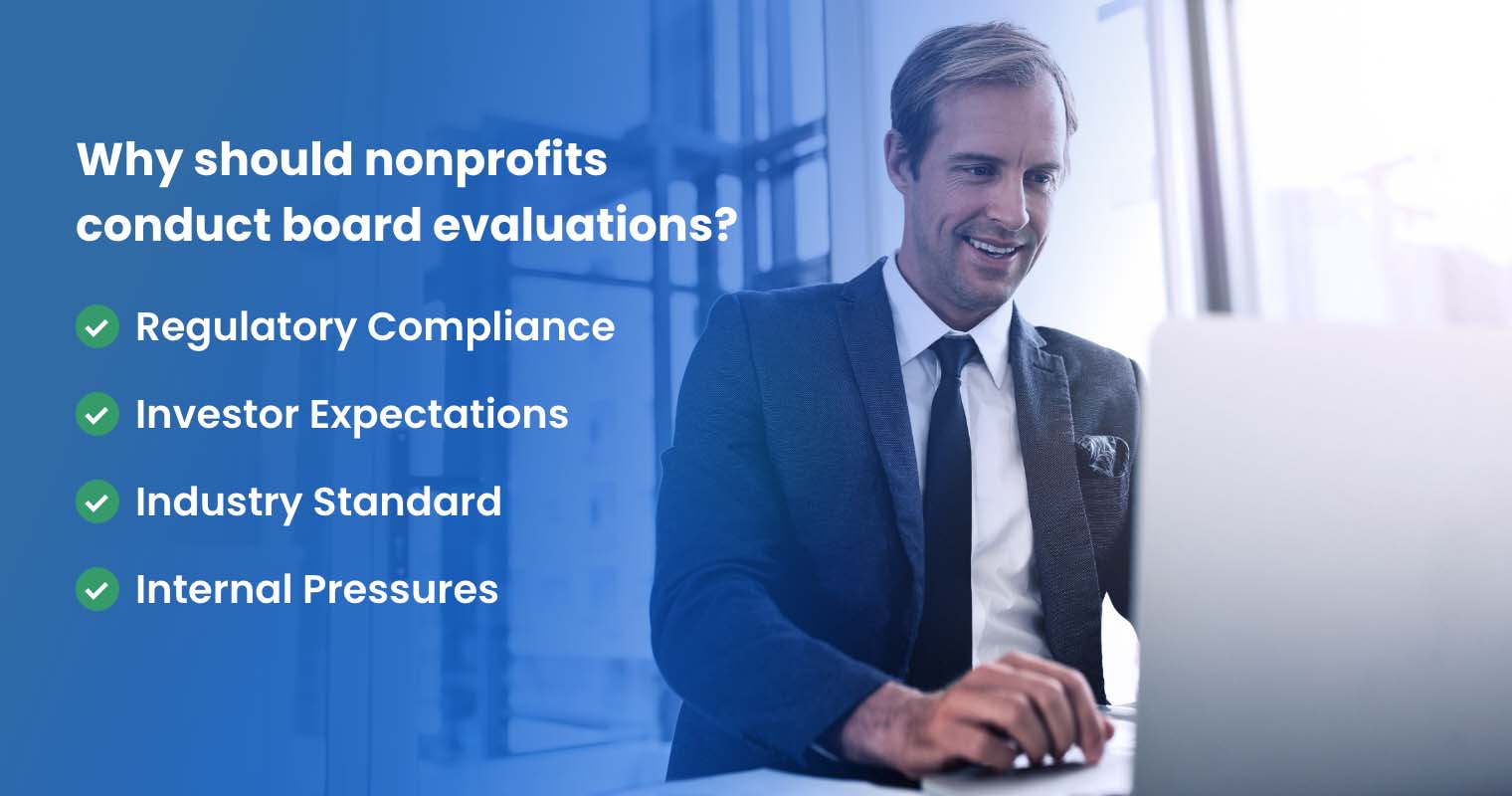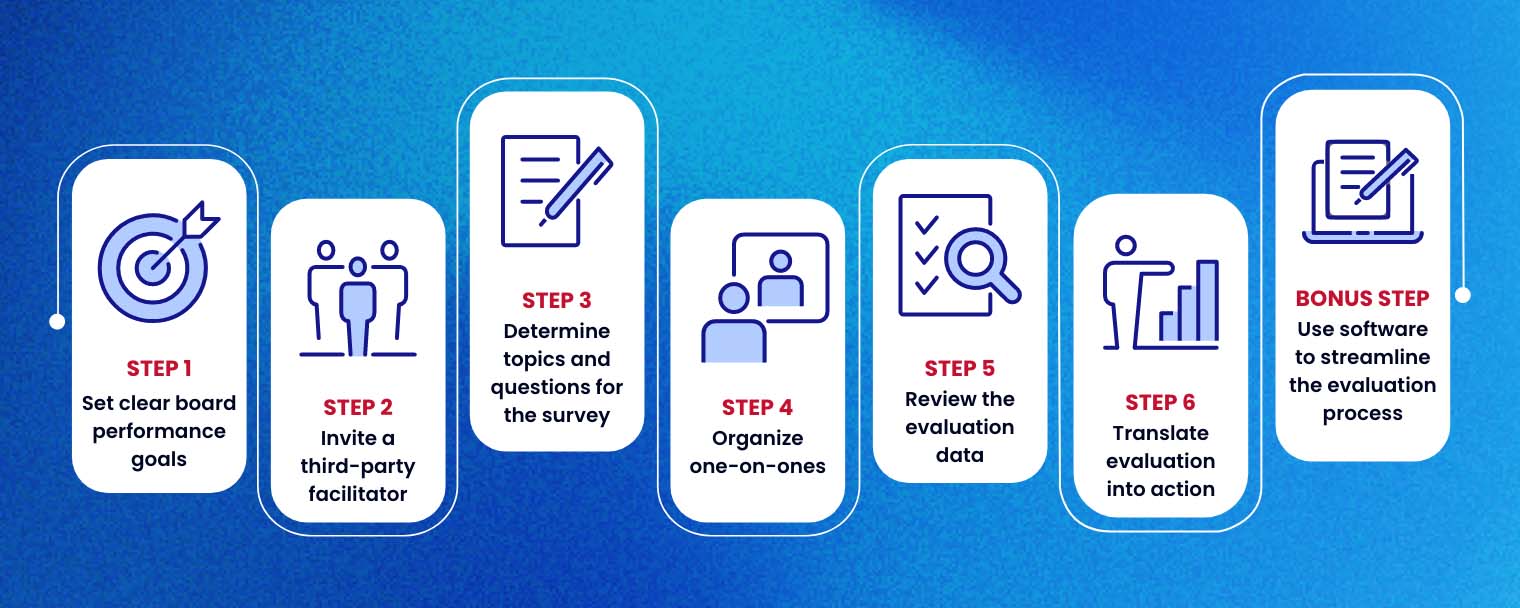A well-performing board is essential to a nonprofit’s success. But how can you tell if your existing board is meeting the standards? How do you know if they are truly fulfilling their roles? Nonprofit organizations often turn to board assessments or evaluations to gain clarity on the board’s effectiveness and make informed decisions about its future.
A regular board effectiveness evaluation helps the board improve and execute better governance. These evaluations can pinpoint pain areas that should be evaluated to enhance the board’s performance and the organization’s compliance purposes.
If you’re considering establishing or polishing your board evaluation process, this article provides what you need to know, plus, some tools to help streamline the workflow.
What is board evaluation?
Generally, a board evaluation assesses the extent to which the members fulfill their duties and contribute to the organizational goals. It also assesses individual directors’, board of directors’, and board committees’ performance, covering their roles, procedures, and work culture. While often associated with larger companies, board evaluations are increasingly recognized as tools for all company types and sizes that measure a member’s accountability, transparency, and overall effectiveness.
Typically, board assessments are conducted annually to identify strengths, weaknesses, opportunities, and threats related to the board’s performance in the previous year. A 2023 U.S. Spencer Stuart Board Index showed that 98% of S&P 500 boards carry out an annual performance evaluation, with 47% undertaking individual director evaluation.
Why should nonprofits conduct board evaluations?

The better question here is, why shouldn’t you? Beyond fulfilling internal accountability and improvement goals, nonprofits face external pressures to conduct regular board evaluations. These pressures stem from various sources, such as:
- Regulatory Compliance: Adherence to legal and regulatory obligations often mandates board assessments.
- Investor Expectations: Even for nonprofits with donors acting as investors, expectations for governance best practices, including board evaluations, are increasing.
- Industry Standard: The ever-evolving frameworks and industry benchmarks often emphasize the importance of board evaluations.
- Internal Pressures: This refers to the growing internal demands for stronger accountability, transparency, and improved governance within the nonprofit organization.
It goes without saying that organizations that neglect the board effectiveness evaluation risk falling behind and missing out on growth opportunities.
What should be included in a board evaluation?
How to measure board effectiveness? These are the key features and considerations you should keep in mind when examining board performance:
- Board Composition and Structure: The assessment of board composition evaluates the board’s skills, expertise, and diversity. It evaluates a balanced mix of financial, legal, marketing, and operational expertise, and a representation of different genders, ethnicities, and socioeconomic backgrounds — that could contribute to a well-rounded perspective and strengthen board oversight and objectivity.
- Financial Oversight: This includes assessing the board’s deep understanding of the nonprofit’s financial health, including their ability to analyze financial statements, assess risk, and make informed decisions about resource allocation.
- Governance Practices: The assessment of the existing governance practice evaluates the effectiveness of board meetings, committees, and decision-making processes.
- Director Performance and Succession Planning: This involves assessing individual director contributions and identifying development needs. The member’s preparedness for leadership transition is also evaluated.
- Operations and Performance: This area assesses the board’s effectiveness in overseeing the nonprofit’s operational strategies and overall performance. It includes evaluating the board’s role in setting performance benchmarks and monitoring the progress of critical organizational goals.
- Dynamics and Culture: Assessing the board culture involves evaluating the relationships and interaction styles within the board, focusing on the dynamics between board members, leadership, and stakeholders.
Who conducts the board of directors evaluation?
The responsibility for conducting a board assessment typically falls within the purview of the board itself, as well as the governance committee. However, specific approaches may vary per organization. Here are three of the most common board of directors evaluation processes:
- Self-Evaluation: If your nonprofit lacks a formal board evaluation process, conducting self-assessments is a great way to start. Begin with individual reflections, then move to a group discussion. Self-evaluation works well for smaller boards and fosters open communication.
- Peer-to-peer Evaluation: As the name suggests, peer-to-peer evaluations, or P2P, allow board members to assess colleagues, providing insights into individual contributions and overall board dynamics. While anonymity can encourage honest feedback, combining peer reviews with self-assessments or external evaluations may be the best way to go about this approach. Remember, the goal is to gather constructive feedback for improvement.
- External Evaluation: New nonprofits often lack the expertise to conduct board assessments. That is why hiring an external consultant may be better, as they can provide valuable insights, impartiality, and specialized knowledge. If budget constraints concern you, you may explore free or low-cost options through local community foundations or nonprofit governance resources.
Board Evaluation Process: Step-by-Step Guide

So, where do you start? We have provided an easy-to-follow guide that will lead you through the seven steps of a successful board evaluation:
Step 1: Set clear board performance goals
Every board assessment should have a clear and defined objective, and board members must understand the reason for conducting it. This way, the evaluation will yield tangible results and be meaningful for the entire board. When determining these goals, consider factors like your organization’s size and industry. Examples of high-level goals include improving board performance, identifying skill or role gaps, implementing board training or development programs, and optimizing strategic decision-making processes.
Step 2: Invite a third-party facilitator
While an external board member is in charge of the board evaluation process, having an independent third-party facilitator can help improve the assessment further. As mentioned above, external evaluators provide expertise and independent perspectives essential to ensure a more holistic board performance evaluation.
An experienced third-party facilitator, such as those of advisory or consulting firms, can lead the process and provide the board with valuable post-survey information regarding industry benchmarks on governance and other board qualities. The facilitator can also advise on best practices that will help improve the board’s overall performance based on industry standards.
Step 3: Determine topics and questions for the survey
Conducting surveys is often the most suitable approach to board evaluations. Surveys offer quantifiable scores and ratings, making it easier to assess board performance and identify areas for improvement. However, since no board is the same, there isn’t a single formula for structuring board evaluation questions. Therefore, you need to tailor the survey questions and structure based on your board’s unique system, goals, and requirements. Include questions that will help collect insightful information on a wide range of board-related topics.
You may categorize the questions into four areas:
1. Does the current board structure work?
- Does the board have clear policies and procedures for board member recruitment, selection, and orientation?
- Does the board have an optimal size and composition to fulfill its responsibilities?
- Are committees clearly defined with specific roles and responsibilities?
2. Is the board effective?
- Does the board express the organization’s challenges and successes to its members and stakeholders?
- Does the organization have short-term and long-term strategic plans?
- Does the board actively engage with potential investors and funding sources?
3. Is there a positive and supportive work culture within the board?
- Do all board members feel valued, respected, and heard?
- How receptive is the board to differing perspectives and opinions?
- Are board members committed to maintaining a professional and ethical environment?
4. Does the board understand the nonprofit’s mission?
- How do board members promote the nonprofit’s vision and mission within the community?
- Do members frequently share information about relevant issues with fellow board members?
- Is there a good nonprofit business plan in place?
Learn more about board assessments and how to properly conduct surveys by downloading this guide.
Step 4: Organize one-on-ones
Questionnaires and surveys can provide a great deal of insight into the board’s workings; however, one-on-one confidential interviews can offer more candid and detailed answers. This is where the help of a third-party facilitator comes in handy.
A third-party facilitator is more likely to have no considerations or biases. Considering the board’s structure and needs, the facilitator will also have the know-how to structure one-on-ones and get the most optimal answers. These private meetings can be facilitated through a virtual meeting via secure video conferencing to ensure confidentiality.
Step 5: Review the evaluation data
Whether the results of the surveys and interviews are favorable to the board’s performance or not, it is a must to analyze and document the results.
Board assessments offer valuable insights that can guide your board to streamline processes and workflows. Assessments also reveal the state of the board dynamics, giving members a chance to improve their collective effort and generate better results.
The board members should also holistically analyze themselves and each other. Any issues that arise or are discovered can lead to discussions among the members for possible solutions. In addition, a separate meeting can serve as a dedicated session for the board evaluation analysis.
At the same time, keeping track of the process and results is as important as the assessment itself. Documenting the findings and recommendations provides a historical record that can be referenced for future evaluations and improvements.
Step 6: Translate evaluation into action
The survey results should serve as the foundation for further improvement across the board’s various areas and activities. That’s why scheduling separate board assessment meetings is so important.
Such meetings give the board enough time to analyze and discuss the findings openly and thoroughly. For it to be effective, the deliverable should be a clear action plan with outlined steps and strategies. Try to prioritize the issues and develop action steps to promote improvement in board performance.
Bonus step: Use software to streamline the evaluation process
The board performance evaluation process needs to be an organized and collaborative effort. Using board evaluation tools such as board portals to conduct surveys or confidential one-on-one helps keep the process secure and structured.
Board portals for nonprofits offer valuable features you can use to perform an evaluation or internal board audit. Generally, such solutions can help board members:
- Send survey and evaluation forms
- Organize quick remote or virtual meetings
- View analytical data and activities of each user
- Store evaluation reports in a secure document repository
- Analyze and visualize reports and survey results
- Assign action items and create annotations
- Create and distribute board packs or documents
Streamline Board Evaluation to Enhance Board Performance with Convene

Regular board evaluations ensure optimal board performance and overall organizational success. By systematically assessing the board’s effectiveness, identifying areas for improvement, and implementing targeted action plans, nonprofits can enhance governance, mitigate risks, and achieve their strategic objectives. Enter board evaluation tools such as nonprofit organization software to simplify the process.
Leveraging a board management platform like Convene can significantly streamline the board evaluation process, making it more efficient and effective. By automating tasks and centralizing information, the best board portal software for nonprofits empowers boards to focus on strategic decision-making while ensuring rigorous evaluation practices. Specifically, Convene can:
- Enhance decision-making: Keep everyone aligned before and after meetings with Convene’s Review Rooms. Members can track action items and ensure timely follow-ups on critical decisions, facilitating smooth progress across discussions.
- Provide centralized document management: Securely store, share, and access important documents within Convene’s Document Library. Keep your board focused by ensuring all necessary materials are available in one centralized, protected location.
- Save time with automation: Prepare for meetings faster with Convene’s intuitive features. Build agendas, distribute documents, and easily schedule meetings, freeing up time for more meaningful discussions and better planning.
- Improve live collaboration: During and after meetings, you can enable real-time discussions with live annotations, ensuring clarity and alignment on decisions made. Out-of-meeting annotations are also possible so members can review and share inputs even after the meeting.
- Provide robust security: Protect your board’s sensitive data with advanced encryption, secure access controls, and detailed audit trails.
Learn how else can Convene improve your board performance and governance here. You can also get in touch with our team for more information.
Jess is a Content Marketing Writer at Convene who commits herself to creating relevant, easy-to-digest, and SEO-friendly content. Before writing articles on governance and board management, she worked as a creative copywriter for a paint company, where she developed a keen eye for detail and a passion for making complex information accessible and enjoyable for readers. In her free time, she’s absorbed in the most random things. Her recent obsession is watching gardening videos for hours and dreaming of someday having her own kitchen garden.


![How to Create a Board Skill Matrix + Template [Free Download]](https://cdn.azeusconvene.com/wp-content/uploads/2024Q3_Jul_Board-of-Directors-Skills-Matrix-Whitepaper-A-Light.png)








